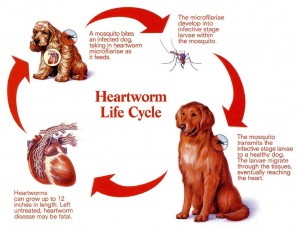 EGADS – Just the name “Heart Worm” brings to mind horrid images of your beloved furry friend being attacked by hungry beasts from the inside!
EGADS – Just the name “Heart Worm” brings to mind horrid images of your beloved furry friend being attacked by hungry beasts from the inside! Now take a deep breath, these worms are not as common as some drug companies would like you to believe. The vets that prescribe this medication get a nice kickback/additional money between the test and the year round prescription that often accompanies it. Is all this medication really necessary?
Let’s take a hard look at the facts:
1. Heartworms are passed from infected dogs to other dogs by mosquitos. The mosquito deposits tiny immature larvae near the bite wound, where they migrate beneath the skin, eventually reaching the hearts and lungs. These worms can grow up to 12 inches
2. Temperature plays a BIG part in the life cycle of heartworms. “Temperatures must remain above 57 degrees F (14 C ) for at least 45 days straight and at least 2 weeks of temperatures over 80 F ( If these conditions are not fulfilled, the parasite cycle cannot be completed and your dog is safe)” –American Heartworm Society.
3. Risks of heartworm infection in your area can be quite exaggerated unless you live in FL, HI or TX. “The lifecycle of the heartworm nematode involves six stages, and a dog can get infected with heartworm only if two of these stages are fully completed inside the body of the mosquito, and those stages can only be completed inside the body of the mosquito if the temperature stays above 57 degrees for at least 45 days straight, both day and night. If the temperature drops below 57 degrees even once during that 45-day period, the lifecycle of the nematode is broken, and heartworm cannot b transmitted to your dog. What this means, in simple terms, is that a year-round program of Heartgard or some other “preventative” medicine is NOT needed in most of the country” -Dr. David Knight and James Lok.
Check the map at this website to verify and talk with your vet about how many cases they have had of positive heartworm tests in the past few months. Map
4. Administering of any drug is never optimal. In reality no one can be absolutely certain if down the road preventive medication doesn’t increase the tendency to chronic disease, organ failure or even cancer. Preventative Heartworm medication ( chemoprophylaxis ) has a wide cost range:
$37.00 for a 6 month supply of Tri-Heart Plus, $69-$99 depending on size of dog for Advantage Multi, and $89 to $109 for Trifexis.
So yes, your dog should be tested for heartworms, yet use this information to make informed decisions about preventative measures and how often to administer the medicine.
Four Paws Pet Sitting is NOT telling you to stop giving yours dogs heartworm medicine year round, but check it out.











Speak Your Mind